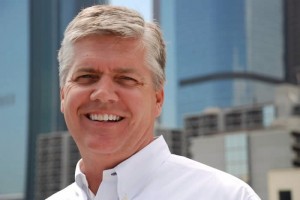By Kate Helm
Over the past seven years, Glenn Pierce ’82, founder and CEO of Pacific Charter School Development (PCSD), a Los Angeles-based developer of charter school facilities, has helped open over 40 schools serving nearly 15,000 previously at-risk youth. But it’s the one child that his newest school touches that means the most.

Glenn Pierce '82
In 2006, Pierce and his wife, Anne, discovered their youngest son, Graham, has autism. While the initial diagnosis was “devastating,” the Pierces quickly took action. In its inaugural year — 2009-10 — the South Florida Autism Charter School (SFACS), located in Hialeah, Fla., had an enrollment of 81 students in kindergarten through eighth grade. Over the next five years, the school plans to add grades 9 through 12 and increase enrollment.
“Anne moved quickly from sadness to research and planning,” says Pierce, chair of the board of SFACS. “This exposed us to the latest theories and introduced us to the core group of parents and educators who would soon become our partners in forming the nonprofit SFACS. Our goal is to continue to lower the barriers to our kids living healthy and productive lives. Advances in technologies and breakthroughs in treatments increase the likelihood that this will happen, but in the meantime, we must make sure that the kids in our care make incremental improvement each and every day.”
After Graham’s diagnosis, the Pierces sent him to a private school. Pierce noticed, however, that the school’s costs were prohibitive for many families, forcing them to pull their children out of those programs. Along with some other parents, he sought public funding available under Florida’s charter school legislation to develop a state-of-the-art school for children on the severe end of the autism spectrum. Pierce calls the support of the Miami-Dade School District and City of Hialeah “unwavering.”
“So far, the results have been pretty remarkable, and the parents are elated with the positive changes they’ve seen in their kids,” says Pierce, noting that each classroom of nine children has one certified teacher and two assistant teachers. “We are heavily vested in peer review, and we continue to tweak the academic, behavioral, and operating processes.”
Pierce enjoys what he calls the double bottom line, a career that provides a reasonable financial return with a product that has significant social impact. PCSD’s major benefactors focus on Los Angeles and other urban areas in California, and include the Bill & Melinda Gates Foundation, Eli and Edythe Broad Foundation, and Walton Family Foundation.
“Sometimes, we all get lost in the process. The goal is not to open another new school building. The goal is to open a new building so that kids have a safe and secure place to reach their highest potential,” explains Pierce, who holds an MBA from Wharton School of Business, University of Pennsylvania. “I make sure that my PCSD team regularly attends the unbelievably uplifting graduation ceremonies that occur in the schools we develop. In neighborhoods where the traditional district adequately prepares less than 10 percent of its students for academic lives after high school, our client charter management organizations routinely place 95 percent of their students in colleges and universities around the country.”
Pierce pauses, then adds, “And yes, I’m encouraging the best and the brightest to apply to Lafayette.”
The personal educational touch that is a hallmark of SFACS and the schools created by PCSD is something Pierce first encountered on College Hill, where he graduated with an economics and business major.
“Lafayette gave me and others an opportunity to get involved in activities that we never could have pursued at a large university,” he says. “My graduation class at Lafayette was 150 students smaller than my high school graduating class. This ability to participate in all kinds of activities with all kinds of stakeholders — administration, faculty, and fellow students — was invaluable in my early career.”
